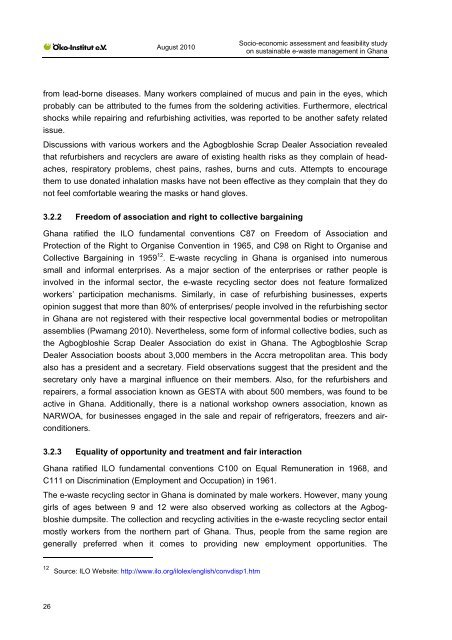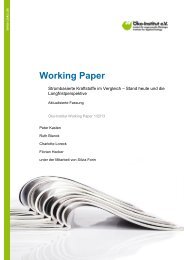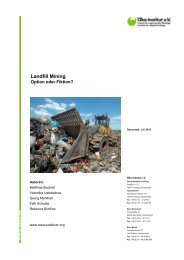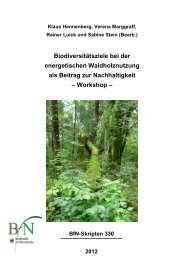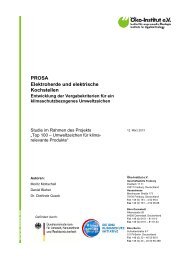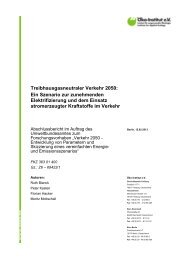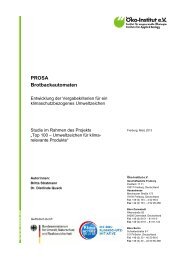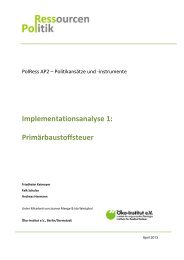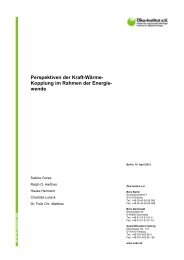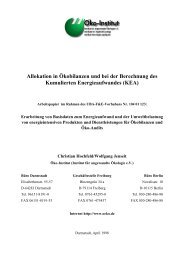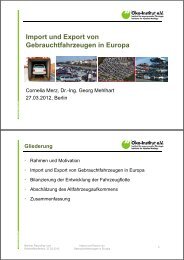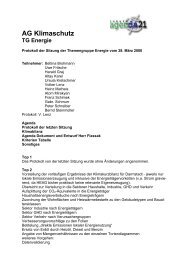Socio-economic assessment and feasibility study on - Öko-Institut eV
Socio-economic assessment and feasibility study on - Öko-Institut eV
Socio-economic assessment and feasibility study on - Öko-Institut eV
You also want an ePaper? Increase the reach of your titles
YUMPU automatically turns print PDFs into web optimized ePapers that Google loves.
26<br />
August 2010<br />
<str<strong>on</strong>g>Socio</str<strong>on</strong>g>-<str<strong>on</strong>g>ec<strong>on</strong>omic</str<strong>on</strong>g> <str<strong>on</strong>g>assessment</str<strong>on</strong>g> <str<strong>on</strong>g>and</str<strong>on</strong>g> <str<strong>on</strong>g>feasibility</str<strong>on</strong>g> <str<strong>on</strong>g>study</str<strong>on</strong>g><br />
<strong>on</strong> sustainable e-waste management in Ghana<br />
from lead-borne diseases. Many workers complained of mucus <str<strong>on</strong>g>and</str<strong>on</strong>g> pain in the eyes, which<br />
probably can be attributed to the fumes from the soldering activities. Furthermore, electrical<br />
shocks while repairing <str<strong>on</strong>g>and</str<strong>on</strong>g> refurbishing activities, was reported to be another safety related<br />
issue.<br />
Discussi<strong>on</strong>s with various workers <str<strong>on</strong>g>and</str<strong>on</strong>g> the Agbogbloshie Scrap Dealer Associati<strong>on</strong> revealed<br />
that refurbishers <str<strong>on</strong>g>and</str<strong>on</strong>g> recyclers are aware of existing health risks as they complain of headaches,<br />
respiratory problems, chest pains, rashes, burns <str<strong>on</strong>g>and</str<strong>on</strong>g> cuts. Attempts to encourage<br />
them to use d<strong>on</strong>ated inhalati<strong>on</strong> masks have not been effective as they complain that they do<br />
not feel comfortable wearing the masks or h<str<strong>on</strong>g>and</str<strong>on</strong>g> gloves.<br />
3.2.2 Freedom of associati<strong>on</strong> <str<strong>on</strong>g>and</str<strong>on</strong>g> right to collective bargaining<br />
Ghana ratified the ILO fundamental c<strong>on</strong>venti<strong>on</strong>s C87 <strong>on</strong> Freedom of Associati<strong>on</strong> <str<strong>on</strong>g>and</str<strong>on</strong>g><br />
Protecti<strong>on</strong> of the Right to Organise C<strong>on</strong>venti<strong>on</strong> in 1965, <str<strong>on</strong>g>and</str<strong>on</strong>g> C98 <strong>on</strong> Right to Organise <str<strong>on</strong>g>and</str<strong>on</strong>g><br />
Collective Bargaining in 1959 12 . E-waste recycling in Ghana is organised into numerous<br />
small <str<strong>on</strong>g>and</str<strong>on</strong>g> informal enterprises. As a major secti<strong>on</strong> of the enterprises or rather people is<br />
involved in the informal sector, the e-waste recycling sector does not feature formalized<br />
workers’ participati<strong>on</strong> mechanisms. Similarly, in case of refurbishing businesses, experts<br />
opini<strong>on</strong> suggest that more than 80% of enterprises/ people involved in the refurbishing sector<br />
in Ghana are not registered with their respective local governmental bodies or metropolitan<br />
assemblies (Pwamang 2010). Nevertheless, some form of informal collective bodies, such as<br />
the Agbogbloshie Scrap Dealer Associati<strong>on</strong> do exist in Ghana. The Agbogbloshie Scrap<br />
Dealer Associati<strong>on</strong> boosts about 3,000 members in the Accra metropolitan area. This body<br />
also has a president <str<strong>on</strong>g>and</str<strong>on</strong>g> a secretary. Field observati<strong>on</strong>s suggest that the president <str<strong>on</strong>g>and</str<strong>on</strong>g> the<br />
secretary <strong>on</strong>ly have a marginal influence <strong>on</strong> their members. Also, for the refurbishers <str<strong>on</strong>g>and</str<strong>on</strong>g><br />
repairers, a formal associati<strong>on</strong> known as GESTA with about 500 members, was found to be<br />
active in Ghana. Additi<strong>on</strong>ally, there is a nati<strong>on</strong>al workshop owners associati<strong>on</strong>, known as<br />
NARWOA, for businesses engaged in the sale <str<strong>on</strong>g>and</str<strong>on</strong>g> repair of refrigerators, freezers <str<strong>on</strong>g>and</str<strong>on</strong>g> airc<strong>on</strong>diti<strong>on</strong>ers.<br />
3.2.3 Equality of opportunity <str<strong>on</strong>g>and</str<strong>on</strong>g> treatment <str<strong>on</strong>g>and</str<strong>on</strong>g> fair interacti<strong>on</strong><br />
Ghana ratified ILO fundamental c<strong>on</strong>venti<strong>on</strong>s C100 <strong>on</strong> Equal Remunerati<strong>on</strong> in 1968, <str<strong>on</strong>g>and</str<strong>on</strong>g><br />
C111 <strong>on</strong> Discriminati<strong>on</strong> (Employment <str<strong>on</strong>g>and</str<strong>on</strong>g> Occupati<strong>on</strong>) in 1961.<br />
The e-waste recycling sector in Ghana is dominated by male workers. However, many young<br />
girls of ages between 9 <str<strong>on</strong>g>and</str<strong>on</strong>g> 12 were also observed working as collectors at the Agbogbloshie<br />
dumpsite. The collecti<strong>on</strong> <str<strong>on</strong>g>and</str<strong>on</strong>g> recycling activities in the e-waste recycling sector entail<br />
mostly workers from the northern part of Ghana. Thus, people from the same regi<strong>on</strong> are<br />
generally preferred when it comes to providing new employment opportunities. The<br />
12 Source: ILO Website: http://www.ilo.org/ilolex/english/c<strong>on</strong>vdisp1.htm


